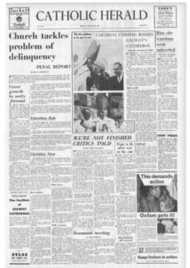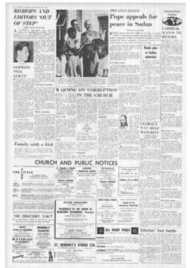Page 3, 20th August 1965
Page 3

Report an error
Noticed an error on this page?If you've noticed an error in this article please click here to report it.
Tags
Share
Related articles
Unpredictable Aspects Of The Ecumenical Field
Discussions On Life Of Religious In World Today
Local Unity Urged After Lambeth Vote
'make Unity Efforts Daily Bread'
The Lighter Side Of Ecumenism
Building a bridge to non-Christian world
MORE than 70 Catholics, Anglicans and Nonconformists taking part in an ecumenical conference at Leicester University have been spending this week discussing the relationship of all Christians to the rest of the world, rather than Christians' relationship to each other.
Fr. Charles Davis, opening the conference on Sunday, said the Church's main function was not to bring people into the fold. It was to spread the ideals of Christianity among all men, including those who will never become Christians.
The conference was organised by Vaughan College, Leicester's department of adult education. It drew men and women from all over England and Scotland.
Fr. Davis pointed to the virtues of today's secular society. It was, in fact, created by Christianity, he said, because it was Christianity that drew the line between the sacred and the secular.
This distinction made it possible for modern science and technology to develop, for religams freedom to emerge, and for philosophy and art to pursue their interest in man and his material universe—for its own sake instead of only as a function of religion.
Freedom's origin
Fr. Davis said the most flighty prized values in today's secular culture, such as humanitarianism and individual freedom, had their origins in Christianity. Yet many Christians looked about them and despaired because Christianity itself was rejected by so many.
"Must we be so pessimistic?" Fr. Davis asked. Many men had lost their faith, hut the faith lost by the average man was an imperfect faith. It was simply taken for granted as part of the culture in which one lived. It did not do justice to Christianity's character as a free, personal response to God's word.
Their role
"Secularism," said Fr. Davis, "is a necessary stage in the advance of the Christian faith. And now that men are coming to grips with the secular world, there is a need to open their minds to religion, to a restored faith. But the restored faith can only be a more personal, more conscious, more intelligently appropriated and freer faith than before."
Fr. Davis sees the role of Christians today as a diaspora, a scattered few, joined wholeheartedly with the rest of the world in trying to solve the problems of human living.
"Modern theology recognises more clearly than before that the Church as a visible community does not mark the limits of God's saving action in the world. Who are we to know God's limits? We must believe salvation is open to all. Everyone can be saved through Christ, even if he is not a Christian."
Anglican's warning The Rev. Martin Jarrett-Kerr, a member of the Anglican community of the Resurrection, said there was a danger in Fr. Davis' v.i ewpoint of being overoptimistic, "People won't be saved if they don't want to be. Merl are still free to say `no' to God, even if the revelation offered to them is only implicit."
In a talk on truth, Mr. JarrettKerr said Christians often made the mistake of expecting their faith to provide ready-made answers for all their problems.
"We've got to look for a different kind of certainty," he said. "The more important a human activity is. the less possible it is to produce the kind of certainty one has in mathematics." To gain true knowledge. one must he humble:2 and "each step in knowledge Is a step in humility".
Danger of pride
Later in the week Fe Davis, in a tails on faith, spoke of the danger of pride. 'There is an area of legitimate doubt for all Christians," he said. "Faith is not a cut-and-dried system. It can be developed, purified, mod i fied, "Today there is a particular need to recognise the place for questions and douhls. When a believing Christian raises questions, he is not doubting God's word but whether a particular point is in fact part of God's word. This can lead to progress in understanding."
blog comments powered by Disqus









